
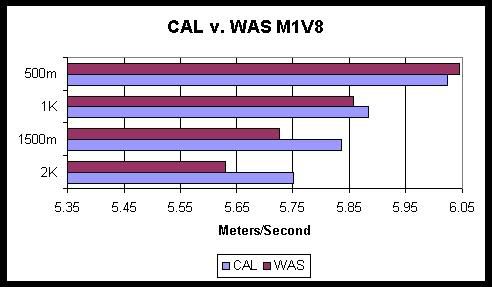
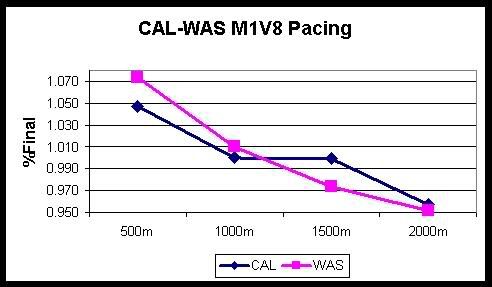
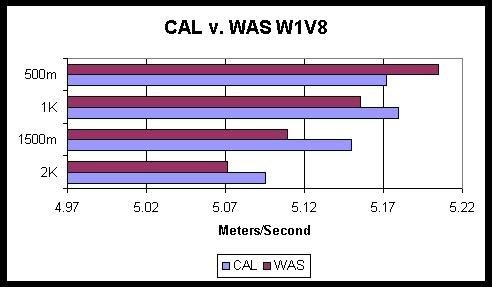
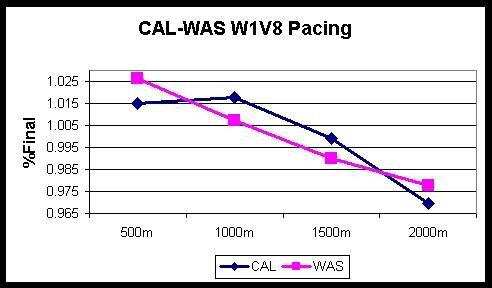
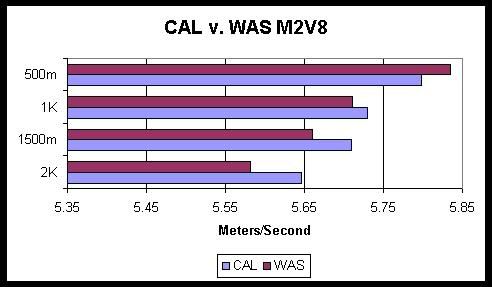
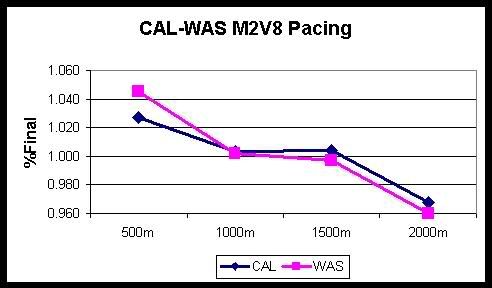
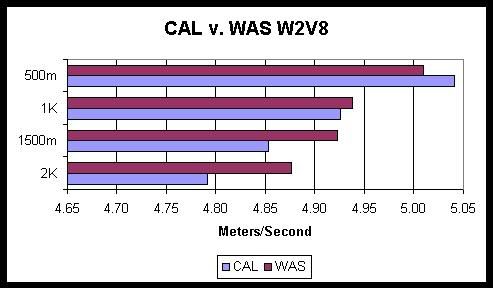
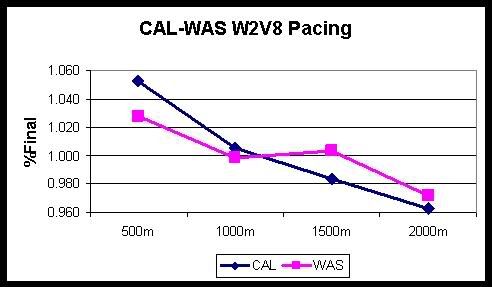
In all four races, the early leader loses (Washington’s men’s & women’s 1V, Washington’s men’s 2V, and Cal’s women’s 2V). What I find interesting is that in each race, both crews fade continuously after the opening 500m; the key difference being that the losers start faster and fade more. This was early-season racing so I doubt if anybody knew their true speed or had developed what they thought was the optimal race plan, so I suspect if we could analyze the NCAA or IRA results we’d see improved pacing strategies all around.
The question about how much of a factor pacing strategy has on racing is a good one. The short answer is, a lot more than just about anybody realizes! In looking at the data I’ve gathered from men’s open indoor races (WIRC & BIRC), it’s clear that those who open with a 500m split that is 3% or more above final average power, have final power outputs at least 20W less than those who start more conservatively. That suggests about 4.5 seconds are lost in a 2K race by the least aggressive fly-and-die artists (and God help some of the poor souls who start out 10%, 20% or more ahead of pace). How can we extrapolate that to races on the water? I couldn’t say exactly, except to suggest that good vs. bad pacing for a given crew will result in at least a 2 second swing in 2K times, and probably 10-15 seconds in some cases. How much potential speed is lost of course depends on how bad the actual pacing is, but it seems obvious that a good crew with bad pacing may lose to an average crew, or an average crew with optimal pacing will have a chance against a good crew with mediocre pacing.
Most likely those races at Redwood Shores were a foregone conclusion (except perhaps for the women’s 1V), but I’m sure they could have been closer. Sometimes the difference in opponents’ abilities can distort the picture, and sometimes a crew is just so dominant it can do just about anything and win. (I’ve looked at the Danish men’s light 4 w/o for the past decade, with some interesting results that I’ll get around to putting up eventually). Again, I’d like to see this year’s NCAA final splits, since Princeton was so dominant. But one thing I’d really like to stress is that while good pacing brings out the best in a crew, there’s no magic race plan that can improve a crew’s speed beyond its own physiological capacity. College crews (and probably elite crews) can be pretty superstitious and hilarious with some of their beliefs about race plans and what gives them the edge. Everybody has some “big move” that they use somewhere in the middle 1000m that they think of as their secret weapon (which they give some risqué name like the “Get Out Of Our Way Motherfuckers While We Row Your Bitch Asses Down Power 20”), but what makes the difference is optimal expenditure of energy to maximize speed while delaying fatigue as long as possible. In my experience, if a program or crew is up against an opponent who is favored, the coaches and athletes typically believe the best strategy is to go out hard, harder, hardest. For example, one year while I was working with UM, one of our crews was the underdog in an early-season race. In that race we were down by ¾ of a length at 500m, held steady during the middle 1000m, and came on strong in the final 500m to lose by ¼ length. When we faced the same crew in mid-season, we were even at 500m, lost a couple seats in the middle 1000m, and faded in the last 500m to lose by 1 length. When we faced the same crew a third time, we moved out to a ½ length lead by 500m, faded to a deck length back at 1500m, and lost by open water. So, the strategy after every loss was to start harder the next time. The result was to lose by more. Unfortunately, you can’t just will yourself to be faster.
Mike Caviston